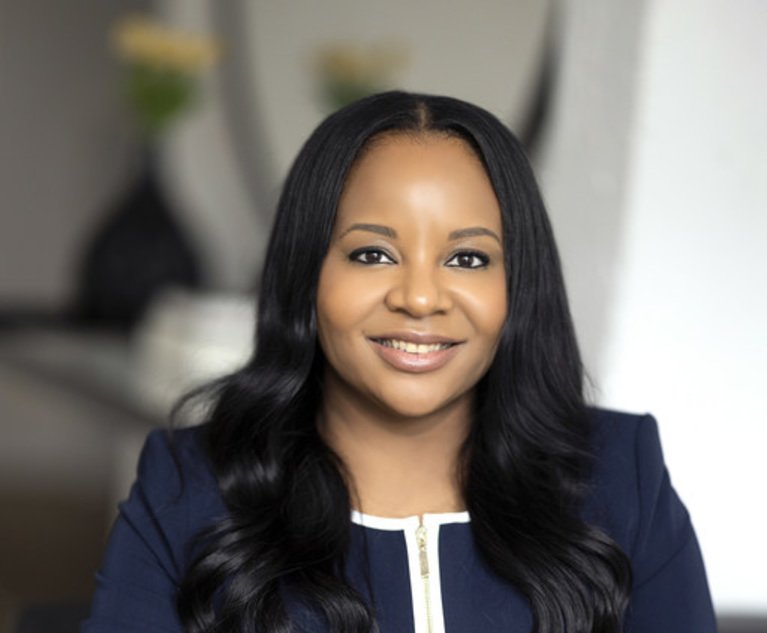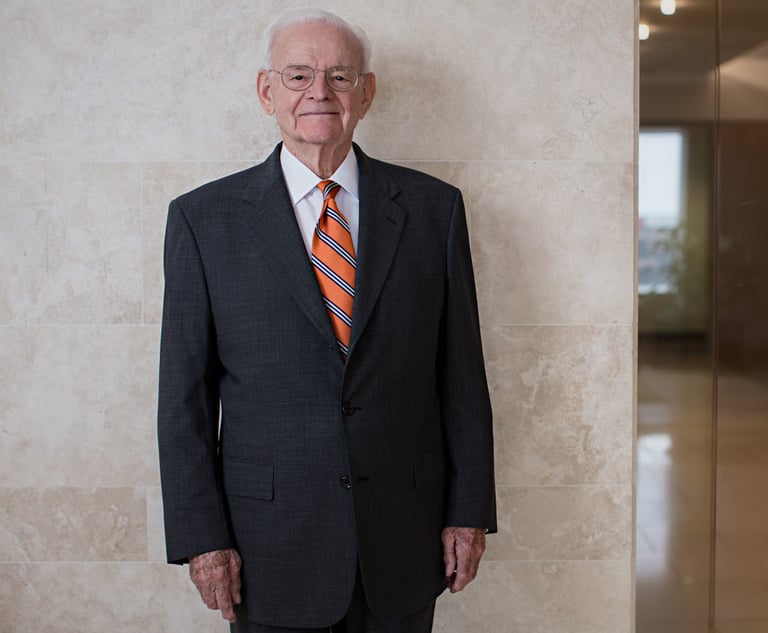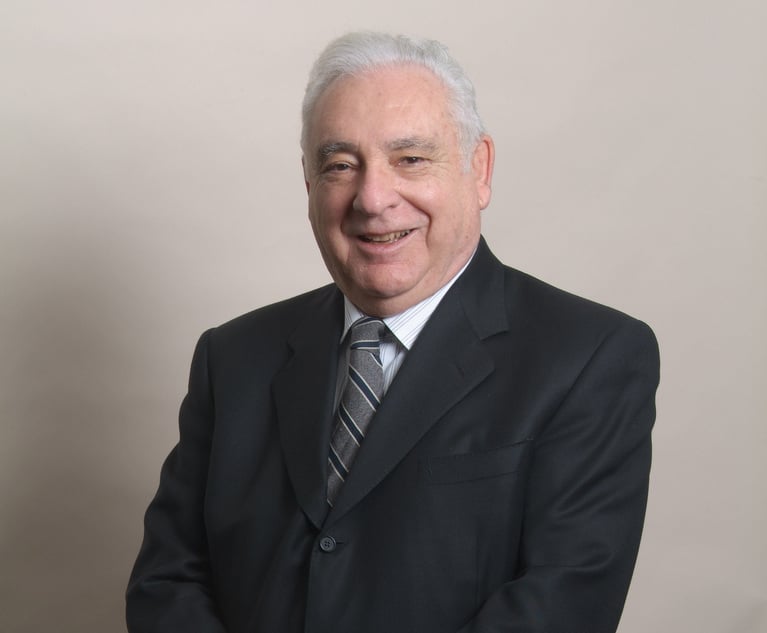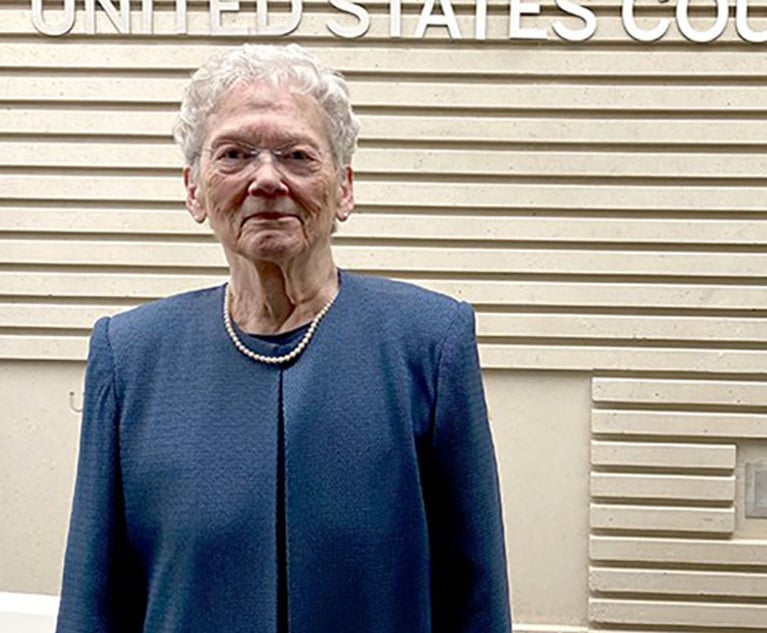 Samantha Williams is a judicial candidate for the Philadelphia Court of Common Pleas. (Courtesy photo)
Samantha Williams is a judicial candidate for the Philadelphia Court of Common Pleas. (Courtesy photo) Samantha Williams Runs for Seat on Philadelphia Court of Common Pleas
It is important for judges to acknowledge that these disparities exist and be devoted to rooting out any potential bias in their decision making.
October 23, 2023 at 11:37 AM
5 minute read
Candidate: Samantha Williams
Court: Philadelphia Court of Common Pleas
Party: Democrat
Philadelphia Bar Association Rating: Recommended
The following has been edited lightly for length and style.
The Legal Intelligencer: How would you describe your judicial philosophy?
Williams: As a recently appointed judge of the Court of Common Pleas, my judicial philosophy has been centered on the pillars of respect and fairness, with a focus on taking an individualized, fact-specific, holistic approach to every case that comes before me. Courtrooms are inherently stressful environments for all parties involved. In my courtroom, I ensure the appropriate application of the law, and take pride in the fact that I've fostered an environment where anyone that walks through my door is met with patience, treated with dignity and has the opportunity to be fully heard.
The Legal: What makes you the best candidate for the role?
Williams: I'm the best candidate for the role because I have the practical experience and life experience to truly make a difference. Beginning my career as a prosecutor provided me with a wealth of trial experience, as well as insight on courtroom operations, judicial protocols and the effective management of caseloads. As a director of legislation and policy [for Councilman Curtis Jones Jr. of the Philadelphia City Council], I was able to then use my knowledge of gaps within our systems to write laws that were aimed at making them fairer and more efficient. In terms of my life experience, I am a product of this city in every sense of the word. I was born, raised and still live in West Philly. I'm Philadelphia educated: through our city's public school system and Temple University. I've dedicated my entire legal career to public service to the city that I will call home for the rest of my life. My well-rounded background and demonstrated dedication to Philadelphia gives me the ability to appropriately apply the law while remaining cognizant of the needs of, and issues facing, those who may appear before me.
The Legal: What is the greatest threat to the practice of law or problem the profession faces?
Williams: A long-standing threat to our profession is an overall lack of diversity. When I speak of diversity, I am not just speaking in terms of gender diversity or racial diversity—I see the need for diversity in age and experience as well. Increasing diversity within our systems enhances the broader opportunity for fairness in our processes.
The Legal: What does your party membership say about you and your legal outlook?
Williams: While I have chosen to run as a Democrat, who I am, and my outlook on the law, is based upon my upbringing in Philadelphia, my dedication to public service and my experience reforming systems for the betterment of our residents.
The Legal: Do you think courts in Pennsylvania have a perception problem when it comes to appearing partisan or polarized? If so, what would you do to combat this?
Williams: There is a public perception problem when it comes to Pennsylvania courts appearing partisan, which I attribute to the partisan nature of our state's judicial elections. This can be combated if every judge commits wholeheartedly to the duty of maintaining independence and applying the law fairly to all, regardless of their individual political beliefs. As a sitting judge, I have fully embraced the non-partisan aspect of our judiciary, and realize its importance in ensuring fairness and impartiality.
The Legal: Several CLEs and bench-bar panels have recently addressed the growing phenomenon of distrust in the courts. In your view, how has distrust in the judiciary created challenges for the bench, and how should judges respond?
Williams: Distrust in our systems is rooted in the inequality of outcomes and is a persistent issue that goes far beyond the judiciary. When race, gender, sexual orientation or socioeconomic status are pitted against implicit biases that decision makers may hold, it undermines true fairness and impartiality in courtrooms. It is important for judges to acknowledge that these disparities exist and be devoted to rooting out any potential bias in their decision making. It is equally important that the judiciary reflects judges from diverse backgrounds, which ensures the presence of individuals that are already aware of these nuances and how they may present themselves in courtrooms.
The Legal: What factors matter in deciding when recusal is necessary, and would you recuse yourself if a campaign contributor were involved in litigation as a party or attorney before you?
Williams: Recusal is required in any circumstance where impartiality could reasonably be questioned. If I were to ever have a case that involved a contributor to my campaign, I consider the nature of any preexisting relationship with the contributor and whether the amount of the donation was one that would lead a reasonable person to believe that I would not be impartial.
The Legal: Who are your role models and mentors?
Williams: My role model is my father, Leon A. Williams, Esq., a civil rights attorney and public education advocate. He instilled in me many things that have made me a more thoughtful jurist: the need to be passionate about public service and community; the duty to use my voice for others who cannot; and the confidence to reject the status quo and embrace my individuality.
NOT FOR REPRINT
© 2025 ALM Global, LLC, All Rights Reserved. Request academic re-use from www.copyright.com. All other uses, submit a request to [email protected]. For more information visit Asset & Logo Licensing.
You Might Like
View All
'Discordant Dots': Why Phila. Zantac Judge Rejected Bid for His Recusal
3 minute read
Judge Louis C. Bechtle: An American Jurist Who Relied on Common Sense, Sound Judgment and Fairness
5 minute read
Samuel M. Lehrer, Retired Philadelphia Court of Common Pleas Judge, Dies
1 minute read
Trending Stories
Who Got The Work
J. Brugh Lower of Gibbons has entered an appearance for industrial equipment supplier Devco Corporation in a pending trademark infringement lawsuit. The suit, accusing the defendant of selling knock-off Graco products, was filed Dec. 18 in New Jersey District Court by Rivkin Radler on behalf of Graco Inc. and Graco Minnesota. The case, assigned to U.S. District Judge Zahid N. Quraishi, is 3:24-cv-11294, Graco Inc. et al v. Devco Corporation.
Who Got The Work
Rebecca Maller-Stein and Kent A. Yalowitz of Arnold & Porter Kaye Scholer have entered their appearances for Hanaco Venture Capital and its executives, Lior Prosor and David Frankel, in a pending securities lawsuit. The action, filed on Dec. 24 in New York Southern District Court by Zell, Aron & Co. on behalf of Goldeneye Advisors, accuses the defendants of negligently and fraudulently managing the plaintiff's $1 million investment. The case, assigned to U.S. District Judge Vernon S. Broderick, is 1:24-cv-09918, Goldeneye Advisors, LLC v. Hanaco Venture Capital, Ltd. et al.
Who Got The Work
Attorneys from A&O Shearman has stepped in as defense counsel for Toronto-Dominion Bank and other defendants in a pending securities class action. The suit, filed Dec. 11 in New York Southern District Court by Bleichmar Fonti & Auld, accuses the defendants of concealing the bank's 'pervasive' deficiencies in regards to its compliance with the Bank Secrecy Act and the quality of its anti-money laundering controls. The case, assigned to U.S. District Judge Arun Subramanian, is 1:24-cv-09445, Gonzalez v. The Toronto-Dominion Bank et al.
Who Got The Work
Crown Castle International, a Pennsylvania company providing shared communications infrastructure, has turned to Luke D. Wolf of Gordon Rees Scully Mansukhani to fend off a pending breach-of-contract lawsuit. The court action, filed Nov. 25 in Michigan Eastern District Court by Hooper Hathaway PC on behalf of The Town Residences LLC, accuses Crown Castle of failing to transfer approximately $30,000 in utility payments from T-Mobile in breach of a roof-top lease and assignment agreement. The case, assigned to U.S. District Judge Susan K. Declercq, is 2:24-cv-13131, The Town Residences LLC v. T-Mobile US, Inc. et al.
Who Got The Work
Wilfred P. Coronato and Daniel M. Schwartz of McCarter & English have stepped in as defense counsel to Electrolux Home Products Inc. in a pending product liability lawsuit. The court action, filed Nov. 26 in New York Eastern District Court by Poulos Lopiccolo PC and Nagel Rice LLP on behalf of David Stern, alleges that the defendant's refrigerators’ drawers and shelving repeatedly break and fall apart within months after purchase. The case, assigned to U.S. District Judge Joan M. Azrack, is 2:24-cv-08204, Stern v. Electrolux Home Products, Inc.
Featured Firms
Law Offices of Gary Martin Hays & Associates, P.C.
(470) 294-1674
Law Offices of Mark E. Salomone
(857) 444-6468
Smith & Hassler
(713) 739-1250





